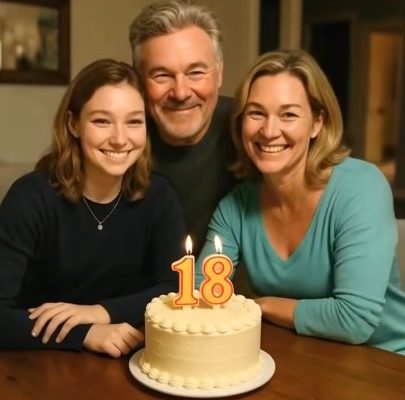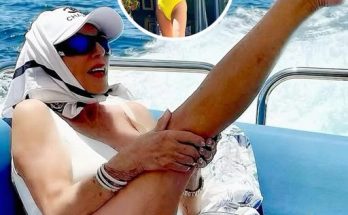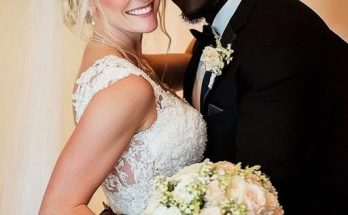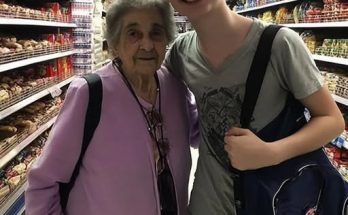I stood there frozen, pancake syrup still on my fingers, my mind racing. My real mother?
Before I could say anything, my mom—my mom—stepped into the doorway behind me.
“Can I help you?” she asked, her voice steady but firm, her hand resting protectively on my shoulder.
The woman looked at her, then back at me, her eyes pleading. “Please… I don’t have much time. I just need to talk to Emma. Alone.”
I glanced at my mom, whose face had gone pale. I could see the pain in her eyes. I didn’t know what was going on, but one thing was clear: something big was being kept from me.
Against every instinct, I turned back to the woman. “We can talk. But not here. There’s a park down the street.”
She nodded quickly, like she was afraid I’d change my mind.
I grabbed a hoodie, texted my dad—“Something happened. I’m safe. I’ll explain soon.”—and left with the woman whose name I didn’t even know yet.
We sat on a worn bench under a sycamore tree. The wind was picking up, and so was my heart rate.
“I’m sorry to show up like that,” she began, voice shaking. “I’m Laura. I gave birth to you when I was seventeen. I was living with my parents—they were strict, religious, and ashamed of me.”
I didn’t interrupt. I just stared.
“They forced me to give you up. I didn’t even get to hold you. They signed all the papers while I was recovering in the hospital. I was told you’d gone to a good family and that I had to move on. So I did. Or I tried.”
She swallowed hard, and her hands gripped the bench so tightly her knuckles turned white.
“But they didn’t tell me everything. And neither did your adoptive parents.”
“What do you mean?” I finally asked.
She reached into her coat and pulled out a faded envelope. Inside was a photo of me as a toddler—one I’d never seen before—and a birth certificate with a last name I didn’t recognize.
“I’ve been trying to find you for years. But records were sealed, and I only found out recently—after my mother passed away—that something wasn’t right with the adoption.”
I frowned. “What are you talking about?”
She looked around, lowered her voice. “You weren’t legally adopted. At least, not at first. My parents had a friend who knew a couple who couldn’t have children. It was all done quietly. No agency, no courts.”
I blinked. “So… are you saying my parents kidnapped me?”
“No, no,” she said quickly. “They raised you with love—I believe that. But they weren’t given you through proper channels. And that could cause serious problems now. Especially since…”
Her voice cracked again.
“Since what?”
“You have a younger sister. Half-sister. She’s sick. She needs a bone marrow transplant. And I was hoping… praying… that maybe you’d be a match.”
That hit me like a punch to the chest. A sister? Sick?
I didn’t know whether to be angry or overwhelmed or just numb.
“I know it’s a lot,” Laura said, tears now openly flowing. “And I don’t expect you to just forgive or forget. But she’s ten. Her name is Mia. And she’s the light of my life.”
I sat in silence, the wind pushing leaves across our feet.
“I need to think,” I finally said.
She nodded, reached into her pocket again, and handed me a small photo of a smiling little girl with big brown eyes.
“That’s Mia. This is my number. If you want to help… if you even just want to talk… please call.”
When I got home, my parents were waiting on the porch. My dad stood up as I walked up the steps. “We didn’t know she’d come,” he said. “We were going to tell you… eventually.”
“Is what she said true?” I asked.
My mom’s eyes filled with tears. “Yes… partly. We didn’t know everything at first. We were desperate. We wanted a child more than anything, and we trusted the people who told us you needed a home. We didn’t find out the truth until later… but by then, we couldn’t give you up. You were already ours.”
“You could’ve told me.”
“We were afraid. That we’d lose you.”
I didn’t yell. I didn’t cry. I just nodded and went up to my room.
That night, I stared at the ceiling for hours. Everything I thought I knew had cracks in it now. But one thing was clear: I didn’t want a little girl to suffer if there was something I could do.
The next day, I called Laura.
“I’ll get tested,” I said. “No promises beyond that.”
She broke down crying. “Thank you, Emma.”
The testing took a couple of weeks. In that time, I visited Mia in the hospital. She was shy at first, hiding behind a blanket, but eventually warmed up. She asked if I liked chocolate ice cream and if I had any pets. I told her yes to the ice cream and no to the pets, but maybe someday.
We laughed. We drew silly pictures. I started bringing her coloring books. One day she asked if I was an angel. I told her no. She said I looked like one.
And the test came back. I was a match.
The transplant wasn’t easy. There were risks. But I did it. For her.
The recovery was rough—for both of us—but Mia got stronger. And with each visit, we grew closer.
My relationship with Laura stayed complicated. I didn’t suddenly feel like she was “Mom,” but I also didn’t hate her. She’d been through hell too. And she was trying.
As for my adoptive parents… we had long talks. Tearful ones. There was pain and disappointment, but also love. We started therapy. We worked through it, slowly, honestly.
One year later, on my 19th birthday, I had two cakes.
One with the parents who raised me, who taught me how to tie my shoes and sing badly in the car.
And one with Laura and Mia, who’d become family in a very different, unexpected way.
I realized something that night as we lit candles and sang out of tune.
Family isn’t one thing. It isn’t just biology or paperwork. It’s not perfect. It’s love. Messy, complicated, painful, healing love.
If you’ve ever questioned where you come from, or felt torn between different parts of your life—know this: you are allowed to hold space for both the pain and the beauty.
You’re allowed to write your own story, even if the first few chapters weren’t what you expected.
Thanks for reading. 💛
If this touched your heart, please share it with someone who needs to hear it. Like, comment, or save—your support means more than you know.



